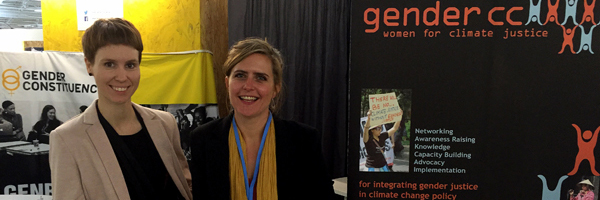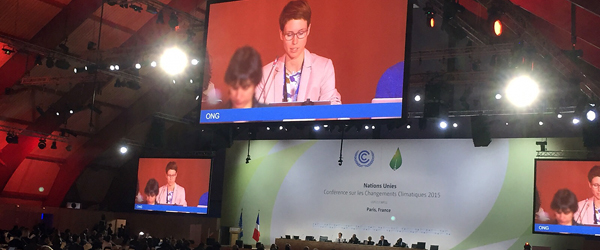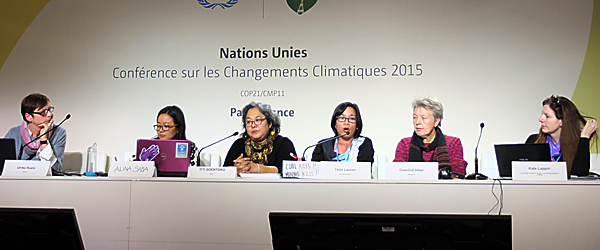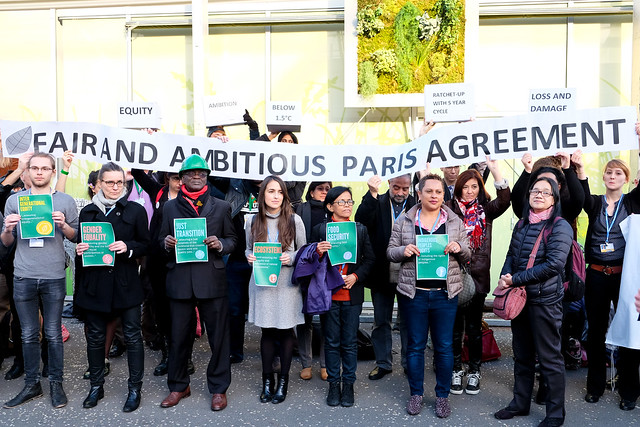Gender and Climate Change Activities @ COP21 - Paris 2015

The twenty-first session of the Conference of the Parties (COP) and the eleventh session of the Conference of the Parties serving as the meeting of the Parties to the Kyoto Protocol (CMP) took place from 30 November to 11 December 2015, in Paris, France.
At COP21, Parties adopted the Paris Agreement, providing a comprehensive framework for addressing climate change which will come into force in 2020.
Gender-related issues and activites played an important role at COP21, yet the final outcome has been widely criticised by civil society organisations and climate justice advocates.
A Reality Check on the Paris Agreement from the Women and Gender Constituency (WGC)
12 December 2015
As the Women and Gender Constituency we came to this process asking one question: what is the purpose of a global climate agreement if not to save people and the planet?
We see that the world wants hope, that we want to congratulate ourselves for moving forward with this process, but leaders, we are here for a reality check. This agreement fundamentally does not address the needs of the most vulnerable countries, communities and people of the world. It fails to address the structures of injustice and inequality which have caused the climate crisis and hold the historical polluters sufficiently to account.
We know that climate change is the greatest threat to rights in our time, and we know that women often bear the brunt of these impacts. We have made progress under this Convention in understanding and responding to the gendered impacts of climate change in the last few years. We believe that operational language on gender equality, alongside other fundamental rights, in Article 2, defining the purpose of the agreement, would have gone far to ensure that all forthcoming climate actions take into account the rights, needs and perspectives of women and men and encourage women’s full and equal participation in decision-making. This was the moment to set the right path, the just path for climate action.
Critical issues like clear emission reductions without offsetting and misleading market approaches; ensuring the quality of technologies which should be safe and socially and environmentally sound; the quality of and a goal for scaling up adequate and predictable, largely public finance; the responsibilities of developed countries to take the lead, the responsibility to protect people’s rights and our ecosystems, have been either surgically removed throughout the text or lack specificity. That we are not protecting food security but instead are protecting food production – and the business interests that have lobbied hard in our home countries – is a clear indication that only certain segments of our population are meant to be served by this agreement. [...]
We know we need to stay below 1.5 degrees for a chance at survival, and we recognize the importance of seeing this goal in the final Paris Agreement. But seeing this goal on paper is not enough. We demand it in actions as the proof of the full commitment to that goal, not a vague aspiration. If not significantly ramped up, countries’ collective emissions plans lead us to the prospect of a 3.2 – 3.7 degree rise. [...]
This agreement has failed to embrace and respond to this moment for urgent and just transitions, but we have not. We have used this space of international policy-making to raise our voices and embolden our movements.
Together, we will continue to challenge injustice for the protection of the people and the planet: Another world is possible!
Read the full statement here.
"Gender in the City: Gender-responsive urban climate change policy"
On December 10, in the German Pavilion at COP21, GenderCC officially launched the “Gender into Urban Climate Change Initiative”, a new project which seeks to integrate gender into mitigation and adaptation policies at municipal level.
Urban action on climate change is receiving growing attention, with cities increasingly considered to be key actors for the implementation of climate policy. However, until now gender issues have rarely been addressed in this context. The project will therefore address this gap, working with project partners in several pilot cities in India, South Africa, and one further country to be confirmed. It is part of the International Climate Initiative (IKI), supported by the German Federal Ministry for the Environment, Nature Conservation, Building and Nuclear Safety (BMUB).
The side event was opened by Rita Schwarzelühr-Sutter, German Parliamentary State Secretary (BMUB), with an introduction to the project provided by Gotelind Alber (GenderCC). Further inputs were given by Dorah Marema (GenderCC Southern Africa), Kalyani Raj (All India Women’s Conference) and Christina Soentoro (Aksi!, Indonesia).
Interventions in COP21 Opening Plenaries

On Day 2 of COP21, several interventions were held on behalf of the Women and Gender Constituency during the opening plenaries. Bridget Burns from Women’s Environmental and Development Organization (USA) called in the COP opening plenary “for a true act of defiance” that would let us leave this COP committing to “a genuinely transformative and binding agreement which challenges dirty economies, political and military systems, and fund renewable and just futures for all”.
In the SBSTA opening plenary, Kalyani Raj from All India Women’s Conference (India) demanded “safe, affordable and gender-responsive technology development and transfer”, as well as a “rejection of market-based mechanisms in the new agreement”, and progress on gender aspects in other areas of the SBSTA agenda.
Kate Cahoon from GenderCC – Women for Climate Justice (Germany/Australia) held an intervention in the SBI opening, pointing out that in discussions under the new agreement, the linkages between gender and mitigation and technology are still lacking. She urged Parties to take the lessons learned under the Lima Work Programme on Gender into consideration and push forward with more urgent action.
"Women at the frontline of climate change fighting for system change"

The first side event of the WGC at COP21 took place on Monday, November 30st, 2015 and was hosted by GenderCC, LIFE e.V., APWLD - Asia Pacific Forum on Women, Law and Development and IBON International. It addressed the urgent need for a system change in order to tackle climate change and inequalities. Speakers gave examples of transformative solutions that are already being developed by women at the local and national level.
Tetet Lauron from IBON International called attention to Philippines devastating foreign investment policies in the mining and coal sector that is driving indigenous communities from their lands. A profound transformation is needed to change how governments and communities, men and women relate to each other in order to reach a new paradigm of accountability.
Alina Sapa from APWLD gave valuable examples of transformative actions taken by local women in Vietnam and Nepal. She stressed the necessity of giving local women's movements space and opportunities to build up their own momentum of local solutions and initiate transformation for system change.
Gotelind Alber from Gender CC - Women for Climate Justice spoke about women and gender aspects relevant to climate change in cities. She pointed out that inequalities in cities are highly visible, providing the example of the distribution of space between rich and poor residents in cities. She emphasised that transformative solutions need to follow a multi dimensional approach and not only focus on the carbon aspects.
Kate Lappin from APWLD followed up by presenting the key demands of the Women & Gender Constituency for the new climate agreement, which address many aspects of system change alongside gender equality. The key demands can be found here.
Ulrike Röhr from LIFE e.V. who moderated the discussion finished by inviting the audience to visit the exhibition space of the WGC in the Climate Generation Space, which features many examples of climate and gender just solutions to climate change.
For photos, click here.

